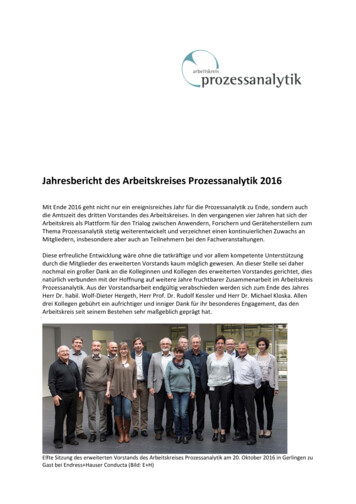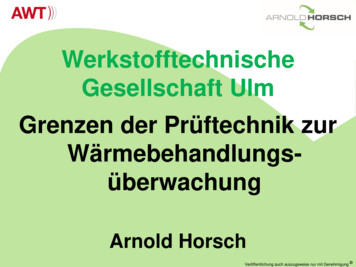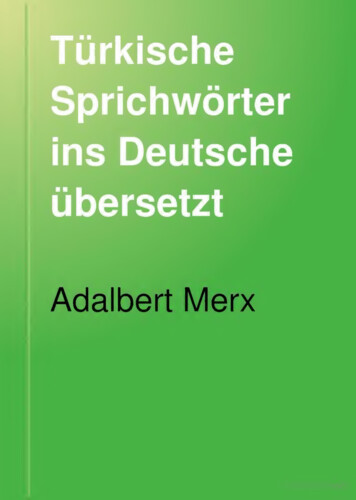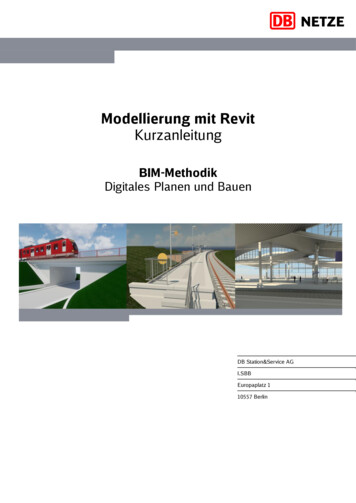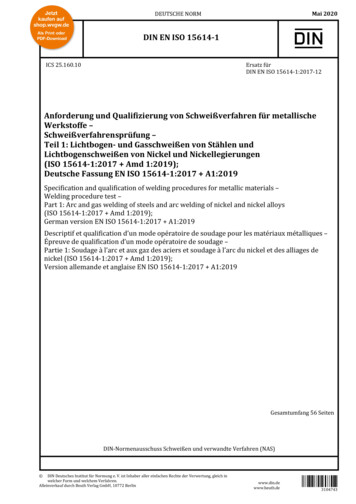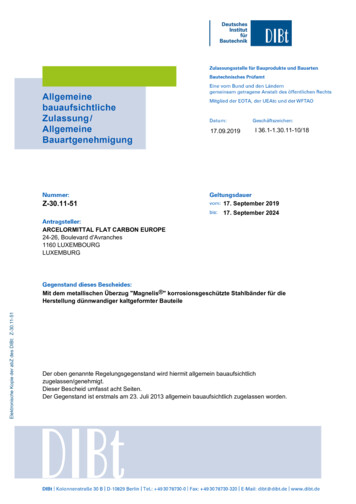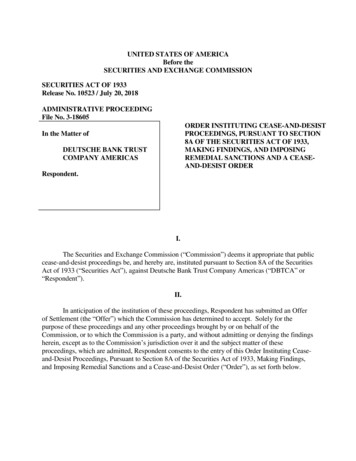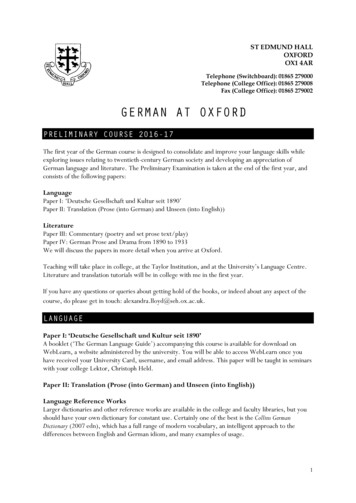
Transcription
ST EDMUND HALLOXFORDOX1 4ARTelephone (Switchboard): 01865 279000Telephone (College Office): 01865 279008Fax (College Office): 01865 279002The first year of the German course is designed to consolidate and improve your language skills whileexploring issues relating to twentieth-century German society and developing an appreciation ofGerman language and literature. The Preliminary Examination is taken at the end of the first year, andconsists of the following papers:LanguagePaper I: ‘Deutsche Gesellschaft und Kultur seit 1890’Paper II: Translation (Prose (into German) and Unseen (into English))LiteraturePaper III: Commentary (poetry and set prose text/play)Paper IV: German Prose and Drama from 1890 to 1933We will discuss the papers in more detail when you arrive at Oxford.Teaching will take place in college, at the Taylor Institution, and at the University’s Language Centre.Literature and translation tutorials will be in college with me in the first year.If you have any questions or queries about getting hold of the books, or indeed about any aspect of thecourse, do please get in touch: alexandra.lloyd@seh.ox.ac.uk.Paper I: ‘Deutsche Gesellschaft und Kultur seit 1890’A booklet (‘The German Language Guide’) accompanying this course is available for download onWebLearn, a website administered by the university. You will be able to access WebLearn once youhave received your University Card, username, and email address. This paper will be taught in seminarswith your college Lektor, Christoph Held.Paper II: Translation (Prose (into German) and Unseen (into English))Language Reference WorksLarger dictionaries and other reference works are available in the college and faculty libraries, but youshould have your own dictionary for constant use. Certainly one of the best is the Collins GermanDictionary (2007 edn), which has a full range of modern vocabulary, an intelligent approach to thedifferences between English and German idiom, and many examples of usage.1
You should also get used to consulting a German-German dictionary. The Taylorian and ModernLanguage Faculty libraries are well equipped. However, if you would like to buy your own,Langenscheidts Großwörterbuch: Deutsch als Fremdsprache is good.Grammar and UsageYou will need the following two grammar books for your language work:Martin Durrell, Hammer’s German Grammar and Usage (Hodder Arnold)Martin Durrell, Katrin Kohl, Gudrun Loftus, Practising German Grammar (Hodder Arnold)Carol Fehringer, German Grammar in Context: Analysis and Practice (Arnold) is also a useful referencework.VocabularyYou will need Sarah M. B. Fagan’s Using German Vocabulary (Cambridge University Press) for yourtranslation classes. The following are also useful:R. B. Farrell, Dictionary of German Synonyms (Cambridge University Press)Randall L. Jones and Erwin Tschirner, A Frequency Dictionary of German: Core Vocabulary for Learners(Routledge)Langenscheidts Grundwortschatz Deutsch. Langenscheidt Basic German Vocabulary (Langenscheidt)Langenscheidts Grundwortschatz Deutsch. Langenscheidt Basic German Vocabulary: Workbook(Langenscheidt)Your first piece of work is a series of grammar exercises (attached – ‘Grammar Overview’). You shouldsubmit this work at the first formal tutor meeting with me in 0th week Michaelmas Term. Do your bestand if there are any rules about which you are unsure, spend some time looking them up and trying toget to grips with them.2
Paper III: CommentaryPoetryYou will need Deutsche Lyrik: Eine Anthologie, ed. Hanspeter Brode (Frankfurt a.M). The list of poems setfor special study for 2016-17 is as follows (with the page numbers from Deutsche Lyrik given in brackets).We will study a selection of the poems in each of the three university terms. You should read those byBrecht, Goethe and Heine before you come up to Oxford in October.Der von Kürenberg: Ich zôch mir einen valken (16)Heinrich von Morungen: Owê, sol aber mir iemer mê (18)Walther von der Vogelweide: Under der linden (24)Fleming: An Sich (47)Gryphius: Thränen des Vaterlandes (50)Hofmannswaldau: Vergänglichkeit der Schönheit (52)Goethe: Willkommen und Abschied (93)Goethe: Auf dem See (96)Goethe: Erlkönig (100)Goethe: Römische Elegien V (102)Hölderlin: Andenken (147)Hölderlin: Hälfte des Lebens (149)Eichendorff: Denkst du des Schlosses noch (171)Müller: Der Lindenbaum (178)Heine: Sie saßen und tranken am Teetisch (185)Heine: Ich weiß nicht was soll es bedeuten (186)Heine: Wie langsam kriechet sie dahin (195)Droste-Hülshoff: Im Grase (201)Mörike: Auf eine Lampe (213)Mörike: Denk es, o Seele! (213)Meyer: Der römische Brunnen (236)Meyer: Auf dem Canal Grande (238)George: Es lacht in dem steigenden jahr dir (250)Lasker-Schüler: Ein alter Tibetteppich (253)Hofmannsthal: Manche freilich . (258)Rilke: Der Panther (263)Rilke: Archaïscher Torso Apollos (265)Rilke: O Brunnen-Mund (269)Stadler: Fahrt über die Kölner Rheinbrücke bei Nacht (276)Heym: Der Gott der Stadt (296)Benn: Astern (288)Trakl: Grodek (305)Brecht: Die Liebenden (319)Brecht: Fragen eines lesenden Arbeiters (322)Brecht: Schlechte Zeit für Lyrik (327)Huchel: Der Garten des Theophrast (347)Celan: Sprachgitter (354)Jandl: wien: heldenplatz (362)Bachmann: Erklär mir, Liebe (366)Enzensberger: Ins Lesebuch für die Oberstufe (371)Brinkmann: Einen jener klassischen (374)3
For this paper, you will also write a commentary (a close-reading) on one of the set texts: Kafka, DieVerwandlung and Schnitzler, Liebelei.Paper IV: German Prose and Drama from 1890 to 1933You will study four plays and four prose texts in the first year. We will work on the plays in Michaelmasterm (Term 1) so you should have read those in German before you come up to Oxford. Term is alwaysvery busy, so it’s essential to do the reading in the vacation.PlaysYou will need to get a copy of each of the following:Arthur Schnitzler, Liebelei (Frankfurt a.M.: Fischer Taschenbuch, 2004)Bertolt Brecht, Die Maßnahme [the 1931 version] (Frankfurt a.M.: Suhrkamp, 1998)Georg Kaiser, Von morgens bis mitternachts (Stuttgart: Reclam, var. editions)Frank Wedekind, Frühlings Erwachen (Stuttgart: Reclam, var. editions)Secondary LiteratureBertolt Brecht, Die Maßnahme: Kritische Ausgabe mit einer Spielanleitung von Reiner Steinweg (Frankfurta.M.: Suhrkamp, 1972)Frank Wedekind, Frühlings Erwachen. Erläuterungen und Dokumente, ed. Hans Wagener (Stuttgart:Reclam, var. editions)Reading on Modern Drama in GermanMartin Esslin, ‘Modernist Drama: Wedekind to Brecht’, in Modernism: A Guide to European Literature1890–1930, ed. by Malcolm Bradbury and James McFarlane (Harmondsworth, 1976; repr.1991), pp. 527–60Walter Hinck, Das moderne Drama in Deutschland: Vom expressionistischen zum dokumentarischen Theater(Göttingen, 1973)Michael Patterson, The Revolution in German Theatre 1900-1933 (London, 1981)General Reading on Modern DramaJohn Peter, Vladimir’s Carrot: Modern Drama and the Modern Imagination (London, 1988), esp. ch. VIIIVolker Klotz, Geschlossene und offene Form im Drama (Munich, 1960; and later editions)Prose TextsYou will need to get a copy of each of the following:Theodor Fontane, Effi Briest (Stuttgart: Reclam, var. editions)Franz Kafka, Die Verwandlung (Stuttgart: Reclam, var. editions)Thomas Mann, Mario und der Zauberer (Frankfurt a.M.: Fischer, 2005)Erich Maria Remarque, Im Westen nichts Neues (Cologne: Kiepenheuer & Witsch, 1999)Secondary LiteratureAlan Bance, Theodor Fontane: The Major Novels (Cambridge, 1982), pp. 163–185John Hibberd, Kafka: Die Verwandlung, Critical Guides to German Literature (London, 1985)Franz Kafka: Die Verwandlung. Erläuterungen und Dokumente, ed. Peter U. Beicken (Stuttgart: Reclam,var. editions)Thomas Mann: Mario und der Zauberer. Erläuterungen und Dokumente, ed. Karl Pörnbacher (Stuttgart:Reclam, var. editions)Brian O. Murdoch, Remarque: Im Westen nichts Neues, Glasgow Introductory Guides to GermanLiterature, 7 (Glasgow, 1995)Ronald Speirs, Mann: Mario und der Zauberer, Critical Guides to German Texts (London, 1990)4
General Reading on NarrativeH. Porter Abbott, The Cambridge Introduction to Narrative (Cambridge, 2008)Monika Fludernik, An Introduction to Narratology (New York, 2009)Robert Scholes and Robert Kellogg, The Nature of Narrative (New York, 1966)René Wellek and Austin Warren, Theory of Literature (London, var. editions), ch. 16, ‘The Nature andModes of Narrative Fiction’Literature Reference WorksYou may find the following useful to refer to:Chris Baldick, The Concise Oxford Dictionary of Literary Terms, 2nd edn (Oxford, 2001)J. A. Cuddon, The Penguin Dictionary of Literary Terms and Literary Theory, 4th edn (London, 1998)H. B. Garland and Mary Garland, The Oxford Companion to German Literature, 3rd edn (Oxford, 1997)David Macey, The Penguin Dictionary of Critical Theory (London, 2000)You should also have a good sense of German literature and history, especially in the period 1890-1933.For this I recommend Eda Sagarra and Peter Skrine (eds.), A Companion to German Literature (Blackwell,1999). On the twentieth century, there is the wide-ranging work, Eva Kolinsky and Wilfred van derWill (eds.), Cambridge Companion to Modern German Culture (Cambridge, 1999). On German history, agood place to start is with Mary Fulbrook’s A Concise History of Germany, 2nd edn (Cambridge, 2004).Please note:The primary texts (i.e. the plays and novels) can usually be ordered via Amazon (www.amazon.co.ukor www.amazon.de) and please do feel free to get second-hand copies. You will be able to accesssecondary texts in the libraries when you arrive in Oxford. If you have any difficulty in getting hold ofthe books, try Blackwell’s Book Shop (01865 792792), or Grant & Cutler Ltd.,www.grantandcutler.com. College Grant funds are available to support these purchases ( 300 per year,of which 50 may be used to purchase books).You should be sure to have your own copy of the following:- The four plays- The four prose texts- Deutsche Lyrik: Eine Anthologie- Martin Durrell, Hammer’s German Grammar and Usage (Hodder Arnold)- Martin Durrell, Katrin Kohl, Gudrun Loftus, Practising German Grammar (Hodder Arnold)There are multiple copies of Sarah M. B. Fagan’s Using German Vocabulary in Oxford, though you mayfind it helpful to invest in your own copy.To make the most of your first term at Oxford you should be sure to have completed the followingtasks before you arrive:1. Read the four plays. This means looking up new words and getting a sense not only of the plot,but also the dramatic techniques used. Don’t worry if you haven’t studied literature at school –use this time to really get to know the primary texts (what happens, why, how that isportrayed?).2. Read the prescribed poems by Brecht, Goethe and Heine. Again, make sure you have looked upnew words and understood the poems linguistically.3. Complete the Grammar Overview sheet.5
- Martin Durrell, Hammer’s German Grammar and Usage (Hodder Arnold) - Martin Durrell, Katrin Kohl, Gudrun Loftus, Practising German Grammar (Hodder Arnold) There are multiple copies of Sarah M. B. Fagan’s Using German Vocabulary in Oxford, though you may find it helpful to invest in your own copy. To make the most of your first term at Oxford you should be sure to have completed the .
